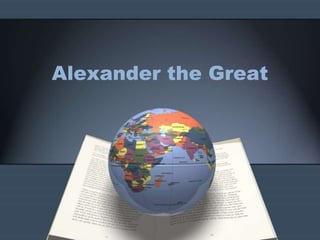
Alexander the great
- 2. Macedonia rose to power and took control of Greece in the years that followed the Peloponnesian War. • Most Greeks considered Macedonians backward – Lived in villages, not cities – Spoke form of Greek unintelligible to other Greeks • 359 BC, Macedonia’s fortune changed when Philip II took throne The Rise of Macedonia • One of Philip’s first actions as king • Adopted phalanx system, but gave soldiers longer spears • Included larger bodies of cavalry and more archers • Set out to conquer Greece – Faced little opposition – Quickly crushed armies – Conquered all but Sparta Army Reorganization
- 3. • Alexander Becomes King • Philip’s conquests might have continued, but he was assassinated • Title, plans for conquests fell to son, Alexander the Great • Alexander only 20, but had been trained to rule almost from birth • Learned warfare and politics from father, mother, and Aristotle Alexander’s Conquests • Alexander faced almost immediately with revolts in Greece • Set out to reestablish control • Used harsh measures to show rebellion not tolerated • Crushed Theban army and sold people into slavery, burned city
- 4. Empire Building Empire • With Greece under control, Alexander decided to build empire • 334 BC, led army into Asia to take on Persians • Army relatively small, but well trained, fiercely loyal • Persian army huge, disorganized Campaigns • Within year Alexander’s army had won victory against Persians in Asia Minor • Moved south to Phoenicia, Egypt; welcomed as liberator, named new pharaoh • Next destroyed Persian army near Gaugamela, in what is now Iraq; caused Emperor Darius III to flee
- 5. Expanding the Empire With defeat of Darius, Alexander the master of Persian world Troops marched to Persepolis, a Persian capital, burned it to ground as sign of victory But Alexander not satisfied with size of empire Led army deeper into Asia, winning more victories Led army to the Indus, perhaps to conquer India Soldiers had had enough, refused to proceed farther from home Alexander forced to turn back to west
- 7. End of the Empire Death at Early Age • Alexander’s empire largest world had ever seen • Did not rule very long • 323 BC, Alexander fell ill while in Babylon • Died a few days later at age 33 • Alexander died without naming heir Power Struggle • Generals fought each other for power • In the end, the empire was divided among three most powerful generals • Called themselves kings – Antigonus became king of Macedonia and Greece – Seleucus ruled Persian Empire – Ptolemy ruled Egypt
- 8. Summarize Why did Alexander’s empire break apart after his death? Answer(s): He did not name an heir, so the empire was divided among three powerful generals.
- 9. By bringing together a number of diverse peoples in his empire, Alexander helped create a new type of culture. It was no longer purely Greek, or Hellenic, but Hellenistic, or Greeklike. • Alexander made conscious effort to bring people, ideas together • Married two Persian princesses • Encouraged soldiers to marry Persians as well Blending Cultures • Appointed officials from various cultures to help rule • Built dozens of new cities, encouraged Greek settlers to move into them • Most new cities named Alexandria New Cities • Alexandria, Egypt • Located at mouth of Nile, where it met Mediterranean • Ideal location for trade • Harbor once busiest in world Most Famous City The Hellenistic World
- 10. • Lives of women also changed significantly in Hellenistic Period • Women had few rights in earlier Greek city-states • Lives began to improve after Alexander, though women still not equal to men • Gained rights to receive education, own property Life for Women • Shift from Hellenic Greece to Hellenistic world brought drastic changes to lives • Most obvious change, how people were governed • City-state no longer main political unit, replaced by kingdom • Traditional Greek democracy gave way to monarchy Drastic Changes Life in the Hellenistic World
- 11. The most influential new school was Stoicism, with emphasis on reason, self- discipline, emotional control and personal morality. Stoics believed people should find their proper role in society and fulfill it. • Blending of cultures brought significant changes • Exchange of ideas from different cultures • New advances in philosophy, literature and science • New schools of philosophy developed in Alexander’s empire • One called Cynicism; students rejected pleasure, wealth, social responsibility • People live according to nature Philosophy Hellenistic Achievements • People should seek pleasure, considered good; try to avoid pain, considered evil • To find pleasure, develop close friendships with people who share similar ideas Epicureans